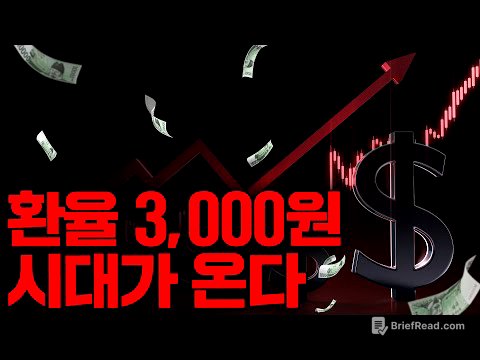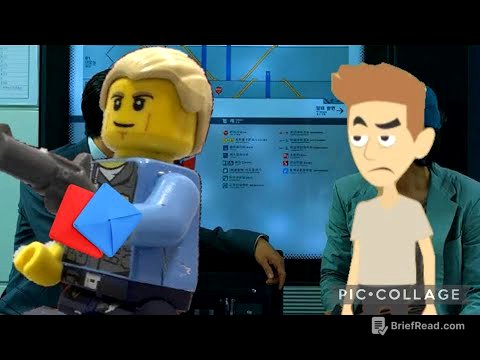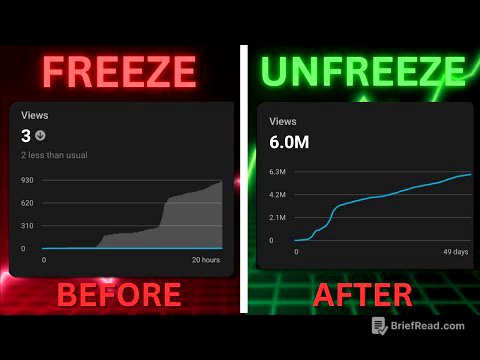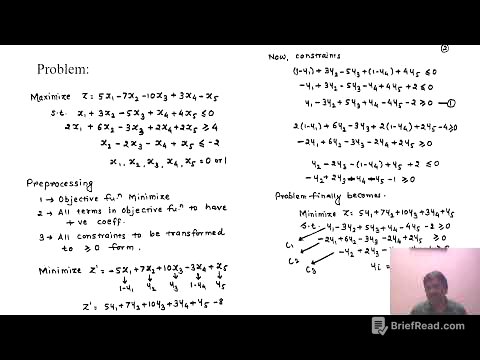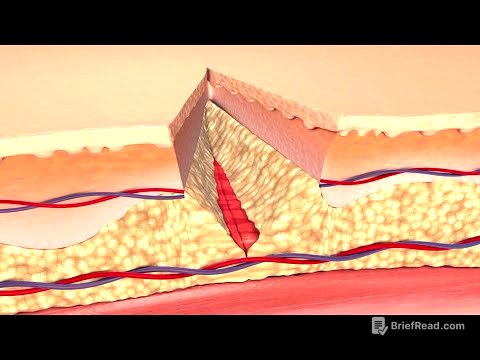TLDR;
This YouTube video by Dominion City UK, featuring Pastor David O.B., explores God's strategy for unlocking individuals from self-absorbed lifestyles to lives of destiny and significance. It emphasises the importance of partnership with the Holy Spirit, embracing the cross, and understanding the four orders of breaking bread. The sermon highlights that true ministry involves sacrifice and a willingness to give one's life for God's calling, and that suffering and breaking are essential for character formation and fulfilling one's divine purpose.
- Partnership with the Holy Spirit is crucial for fulfilling God's mandate.
- Embracing the cross and self-cancellation are necessary for achieving glory.
- Breaking is essential for character formation and fulfilling one's divine purpose.
- True ministry involves sacrifice and a willingness to give one's life for God's calling.
Introduction: Dominion and God's Kingdom [0:00]
The sermon begins by asserting that God created humans to have dominion over the Earth, controlling circumstances just as God controls the heavens. It emphasises that the kingdom of God is within people, and advancement comes through the advancement of those people. Faith must be supported by action, aligning with the ministry's assignment.
Welcoming the Holy Spirit [0:57]
The congregation is led in a prayer to welcome the Holy Spirit, asking for a fresh breath of life and the sealing of sacrifices with fire. The prayer requests that everyone be invited into the inner place of the king's chamber to receive divine revelation and impartation of life. It seeks healing, deliverance, and the quenching of spiritual thirst, acknowledging the Holy Spirit as the greatest gift.
God's Strategy for Unlocking Destiny [7:54]
Pastor David explains that many believers are locked in self-centred living. He will discuss God's strategy for unlocking people from self-absorbed lifestyles to a life of destiny and significance. He notes that God uses particular types of people, and one should never drop their gifts or calling, as these are without repentance. He uses the example of David, who remained a musician even after becoming king.
Partnership with the Holy Spirit [9:32]
The sermon revisits the four orders of breaking bread, emphasising the importance of the Holy Spirit as a friend and partner in fulfilling God's mandate. It highlights the grace of Jesus Christ, the love of God the Father, and the communion, fellowship, friendship, partnership and Oneness with the Holy Spirit. The speaker stresses that one is never alone with the Holy Spirit, who never abandons. He values the partnership with the Holy Spirit because without it, there is no ministry.
Oneness with the Spirit [12:00]
Pastor David describes the Oneness with the Spirit, where the human spirit and the spirit of the Lord become one. He explains that in this state, it becomes difficult to distinguish between one's own voice and the Holy Spirit speaking through them. This is referred to as Spirit possession, or being filled with the Spirit. He encourages listeners to welcome the Holy Spirit, seeking to be brought into a place of Oneness where the soul and spirit are not in confusion.
Drinking of the Spirit [14:49]
The speaker explains that drinking of the Spirit involves speaking, welcoming, and appreciating Him. He quotes scripture about coming to the waters and drinking, emphasising that one cannot drink with their mouth closed. The key to being filled with the Spirit is the tongue, and through speaking, one can experience the Oneness of the Holy Spirit.
Transformation and Revelation [16:19]
The sermon describes the transformation that occurs when one is filled with the Spirit, turning into another person and enabling the impossible. It activates a higher sense, drowning out natural senses and bringing the inward man alive. This state allows one to see like God sees, know things beyond natural senses, and move in realms of power and revelation.
The Road to Emmaus: Understanding the Scriptures [19:35]
Referencing Luke 24, the speaker discusses Jesus's appearance to two disciples on the road to Emmaus. He notes that their eyes were restrained from recognising him, and they were sad because they only focused on his death, not his resurrection. The speaker emphasises that a complete gospel includes both the defeat of the cross and the power of the resurrection.
The School of Breaking [22:01]
Pastor David asserts that there is a school that everyone God uses must pass through: the school of breaking. This school, often experienced in the wilderness or through the cross, is where God works on one's life. He cautions against blaming others for hardships, noting that it pleased the Lord to bruise Jesus. Yielding to the lessons of this stage is crucial to avoid prolonged suffering.
The Importance of Invitation and Revelation [24:31]
The speaker explains that God asks questions not because He lacks answers, but to open one's eyes to what they are not seeing. He highlights that God operates by invitation and moves where He is appreciated, adored, and welcomed. Revelation is key to accessing God's presence and understanding His plans.
The Rugged Cross and Self-Cancellation [25:24]
The sermon emphasises that genuine Christianity has a rugged cross at its heart. Before coming into glory, one must embrace their cross. There is no crown without the cross, no crowning without crucifixion, and no glory without self-cancellation. God will not use someone until He kills the self-centred nature within them.
The Four Journeys of a Christian [28:31]
Pastor David outlines the four journeys every Christian must make to come into their place of glorification and affect the world. He notes that God often acts as if He would go further, waiting for an invitation. The Holy Spirit comes by invitation and leaves by neglect, so it is important to welcome Him afresh.
The Breaking of Bread: Revelation and Access [31:14]
The speaker discusses the four actions Jesus took with the bread: He took it, blessed it, broke it, and gave it. It was then that the disciples' eyes were opened, and they recognised Him. There are two ministries: opening scriptures and opening the eyes of people. The communion removes the veil from people's eyes, revealing the resurrected Christ.
The Four Orders of Breaking Bread [35:29]
The four orders of breaking bread are: Lord take me, Lord bless me, Lord break me, and Lord make me a blessing. Ministry begins at the fourth stage, where one becomes food for others. God takes, saves, and then blesses individuals, preparing them to be a blessing.
The Bread and the Wine: A Deeper Revelation [37:45]
The bread represents Jesus's body broken for us, and the wine represents His blood shed for the remission of sins. However, the bread also represents the believer who will be broken for the world to be healed, and the wine represents the believer's life poured out for the deliverance of many. The cross is not just for Jesus but for everyone involved in saving nations.
Redemptive Suffering [38:58]
The speaker clarifies that undeserved suffering has redemptive value, unlike suffering that is a consequence of one's own sins. Suffering that prepares one for greater usefulness in God's hand is not a result of wrongdoing but a process for those already serving God.
Communion and Discerning the Lord's Body [42:22]
The bread represents the communion of the body of Christ, and all are partakers of that one bread. The wine represents the believer's life poured out for the deliverance of many. Paul intervened when the Corinthians were falling sick and dying after taking communion because they were not discerning the Lord's body, which refers to the church.
The Church as God's Agency [44:07]
The church is God's agency, the only institution He raised up to represent Him on Earth. Fighting the church is fighting Christ directly. Taking communion means entering a covenant with brothers and sisters, and going against them brings destruction. Many fall sick and die prematurely because they do not discern the Lord's body.
Judging Ourselves and God's Chastisement [48:47]
If we judge ourselves, we will not be judged. God brings correction because we don't take care of things ourselves. Even believers who die are chastised by God so they will not be condemned with the world. The four orders of breaking bread apply to Jesus, individuals, and the church.
Jesus as the Bread of Life [50:33]
The Lord took Jesus, blessed Him with a powerful ministry, brought Him to the cross, broke Him, and then gave Him the ministry of being a saviour to all nations. Before success comes pain, and before significance comes success. If Jesus did not go to the cross, He would have only been remembered as a great prophet.
Examples from the Old Testament: Joseph [57:19]
God took Joseph from his father's house, gave him a dream, and blessed him in Potiphar's house. After this blessing, Joseph faced pain when Potiphar's wife lied about him, leading to his imprisonment. After prison, God made him prime minister, saving the world from famine.
Examples from the Old Testament: Moses [1:00:01]
God took Moses, placing him in a basket and then into Pharaoh's house, raising him as the Prince of Egypt. God then took him to the wilderness and broke him for 40 years before bringing him back to deliver Israel from bondage.
Examples from the Old Testament: David [1:05:02]
God took David from looking after sheep and brought him to kill Goliath, blessing him with anointing. David found favour with Saul, becoming a commander in the army. However, an evil spirit came upon Saul, driving David into the wilderness for years before he became king.
Examples from the New Testament: Paul and John [1:07:10]
Paul the Apostle, blessed with wisdom and a lawyer, persecuted the church before God picked him and broke him. John the Apostle, loved by Jesus, was banished to the island of Patmos, where he wrote the Book of Revelation.
The Importance of Breaking and Purpose [1:10:27]
There is something bigger in you that the world is looking for. If God does not work on you, you will die with it. The children of Israel were blessed in Egypt but failed to fulfil their destiny because they relaxed and settled down.
Destiny and Breaking [1:12:32]
If God speaks a destiny into your life, it will impact many people. Breaking is necessary to produce men who fear God and obey His word. The promised land is a place of abundance, but one must beware of forgetting God.
The Purpose of Breaking: Humility and Character [1:17:27]
Breaking is needed because the you that started the journey is not the you that will finish it. The original you must die. There is a higher purpose for the blessing and anointing, which is others. Breaking is the tool for the formation of character.
The School of Wilderness [1:34:11]
The school of wilderness is where God prepares individuals for their calling. It is essential to rededicate oneself to the pursuit of that purpose. The millions one earns are to fund the gospel, not for personal indulgence.
Two Classes of Believers [1:39:13]
There are two classes of believers: those at the stage of blessing and those at the stage of being a blessing. The second stage is where generals are born. Keeping the vision of the promised land helps one endure the refining season.
Yieldedness and Communion [1:41:15]
Lay down struggles at the altar and don't let the fire do it for you. Yieldedness reduces the work the furnace has to do. The sermon concludes with a prayer for open eyes, removal of veils, and a move from self-centred pursuits to becoming instruments of deliverance.

